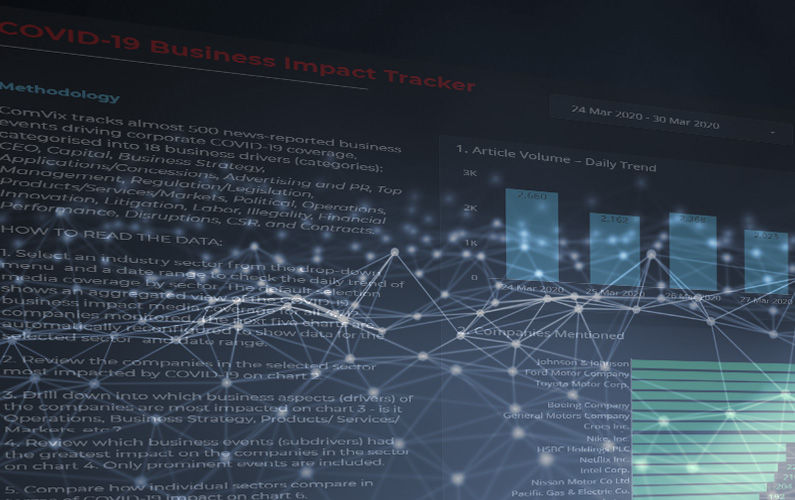As restaurants and bars around the world closed down to slow the spread of the coronavirus, food and beverage has been one of the most heavily affected industries during the crisis.
The ongoing social distancing measures have created a ripple effect in the manufacturing, production and distribution operations of food and drink companies, while consumers’ hoarding practices have sometimes resulted in empty store shelves.
We decided to use the Commetric COVID-19 Business Impact Tracker to help us understand which business events within the food and beverage industry gained the most traction in the media during the COVID-19 crisis. Our free tool uses rule-based natural language processing (NLP) and machine learning to track more than 450 types of news-reported business events that affect companies and industries during the pandemic.
We analysed media data from thousands of outlets for the period 1 Jan – 13 April 2020, covering most publicly-traded companies in the US, and looked into the media resonance of the various activities within the food and drink sector that took place in the context of COVID-19, i.e. the amount of media coverage that referenced food and drink companies in relation to the pandemic.
We found that the most impactful business driver was financial performance, which featured articles primarily on financial forecasts and earnings announcements.
Apart from identifying and categorising general business drivers, the COVID-19 Business Impact Tracker uses advanced NLP to disambiguate sentence structure and classify the business events that drive media coverage. Thus, the following chart shows the business events with the highest media share of voice within the top five business drivers for the food and drink industry:
Within the strongest business driver – financial performance – many companies reported worse than expected results. A particularly prominent company here was Anheuser-Busch, the world’s largest beer maker, which suffered a greater than expected fall in core profit and forecast muted growth in 2020.
Meanwhile, there were some which affirmed their financial forecast: for example, Coca-Cola said it still anticipates to achieve its previously provided full-year guidance.
But there were also some companies that raised their financial forecast – General Mills, for instance, raised its outlook for the year as it faces high demand for its cereals, soups and other products which people tend to hoard.
The rising demand for some goods also resulted in a higher volume of news coverage within the products/services driver, with companies such as Campbell Soup ordering more ingredients to ensure it can meet the needs of retailers.
The operations driver included mainly reports about unit closers: for example, Altria Group temporarily suspended operations at Philip Morris’ manufacturing facility at Richmond, Va., after two employees tested positive for COVID-19.
The media conversation around Altria Group was also influenced by the CEO driver, as the company’s CEO Howard Willard became the first top US executive to have tested positive for the virus.
Anheuser-Busch was the most often mentioned company, as we discovered thanks to the Commetric COVID-19 Business Impact Tracker:
In addition to the financial performance, Anheuser-Busch owed its prominence to the business strategy driver, as it announced that it will be producing hand sanitizer.
Many reports around Coca-Cola fell under the operations driver, as the company started reopening some of its plants in China which it had closed to help prevent the spread of the coronavirus. In a similar manner, Mondelez said some of its plants in China had resumed operations although not operating at full capacity.
Coca-Cola‘s biggest competitor, PepsiCo, was prominent because of the capital driver, with commentators pointing out that there are good reasons to invest in the company during the crisis – one such reason was the recent acquisition of energy drink company Rockstar.
In the meantime, the media discussion around Hormel Foods was shaped by the CSR/governance driver, as the company announced it will donate 200,000 meals to COVID-19 hunger-relief efforts during its virtual live concert event.
Hormel Foods‘ virtual event was promoted as a way for the company to thank its team members for their continued efforts to provide food to the world – an initiative which gained traction under the advertising/PR/brand driver.
